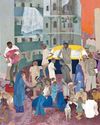
Scottish writer–historian William Dalrymple is the author of more than a dozen books, including bestselling titles such as City of Djinns, White Mughals and The Last Mughal. His most recent book, The Anarchy—The Relentless Rise of the East India Company (Bloomsbury) has been described as his “most ambitious work yet”. Reader’s Digest caught up with the acclaimed author just ahead of the Jaipur Literature Festival this month.
You begin Anarchy by showing how the English word ‘loot’ came from the Hindustani word for ‘plunder’. But some people in India and Britain believe that the English gave the colonies the gift of the English language. Is that narrative a skewing of history?
Obviously there are very complicated questions. All empires involve one set of people dominating another set of people; all empires are violent; all empires tend to be extractive. The story of the East India Company shows that when the British first came to India, it didn’t come as a conquering state. They came in this very unexpected form of a trading company, which then militarizes. But the Company, from the point it begins to conquer Indian territory, has no motive other than profit. The idea that the British came here to bestow railways, the English language, cricket and tea is a later Victorian spin, that bears no historical reality at all (laughs).
Diese Geschichte stammt aus der January 2020-Ausgabe von Reader's Digest India.
Starten Sie Ihre 7-tägige kostenlose Testversion von Magzter GOLD, um auf Tausende kuratierte Premium-Storys sowie über 8.000 Zeitschriften und Zeitungen zuzugreifen.
Bereits Abonnent ? Anmelden
Diese Geschichte stammt aus der January 2020-Ausgabe von Reader's Digest India.
Starten Sie Ihre 7-tägige kostenlose Testversion von Magzter GOLD, um auf Tausende kuratierte Premium-Storys sowie über 8.000 Zeitschriften und Zeitungen zuzugreifen.
Bereits Abonnent? Anmelden

BOOKS
Books review

STUDIO - Off Lamington Road by Gieve Patel
Oil on Canvas, 54 x 88 in

NEWS FROM THE WORLD OF MEDICINE
FOODS THAT FIGHT DEMENTIA

TO HELL AND BACK
The Darvaza crater in Turkmenistan is known as the Gates of Hell. I stood on its edge - and lived to tell the tale

THE SNAKE CHARMERS
Invasive Burmese pythons are squeezing the life out of Florida's vast Everglades. An unlikely sisterhood is taking them on

Sisterhood to Last a Lifetime
These college pals teach a master class in how to maintain a friendship for 50-plus years

...TO DIE ON A HOCKEY RINK
ONE MINUTE I WAS PLAYING IN MY BEER LEAGUE, THE NEXT I WAS IN THE HOSPITAL

Just Sit Tight
Broken, battered and trapped in a ravine for days, I desperate driver wonders, \"Will anyone find me?\"

Allow Me to Mansplain...
If there's one thing we know, it's this: We're a nation of know-it-alls

THE BITTER TRUTH ABOUT SUGAR (AND SUGAR SUBSTITUTES!)
It's no secret that we have a serious addiction. Here's how to cut back on the sweet stuff, once and for all.